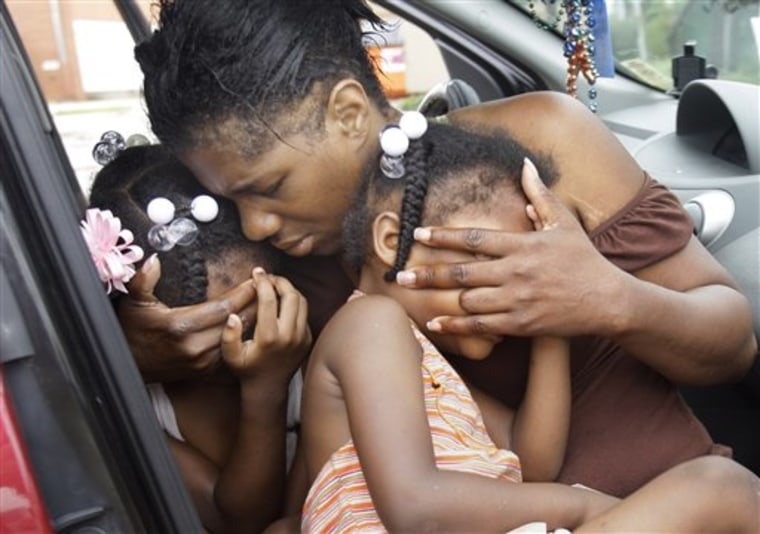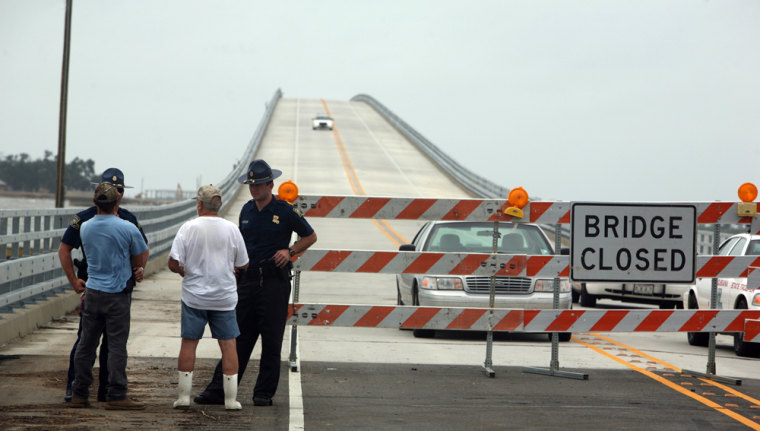New Orleans Mayor Ray Nagin said late Tuesday that residents can return to the city early Thursday to look at the damage caused by Hurricane Gustav, but he advised them not to stay.
In making the announcement, the mayor warned that many homes still do not have electricity and that water and sewer systems are running on backup power.
Nagin said there are few businesses open and a dusk-to-dawn curfew will remain in effect.
Millions fled the Gulf Coast in fear of Gustav, which Nagin had billed as an apocalyptic "mother of all storms." Now, with Gustav not living up to the warnings and with three other storms lining up in the Atlantic, some fear people might not listen next time.
The first of the 2 million people who fled Gustav began to trickle home Tuesday from shelters, and many were grumbling about the food, the heat, the overcrowding, the uncertainty and the frustrating wait for the all-clear. Some evacuees, particularly in Texas, on the far fringes of the storm's path, suggested authorities overreacted in demanding they leave their homes.
"Next time, it's going to be bad because people who evacuated like us aren't going to evacuate," Catherine Jones, 53, of Silsbee, Texas, who spent three days on a cot at a church shelter with her disabled son. "They jumped the gun."
Emergency officials strongly defended the decision to evacuate coastal areas, saying that with something as unpredictable as a hurricane, it is better to be safe than sorry — a lesson driven home by Katrina, which killed 1,600 people in the U.S. in 2005, compared with nine deaths attributed to Gustav.
President Bush on Tuesday declared a major disaster exists in the Louisiana and ordered federal aid to supplement state and local recovery efforts in the area struck by Gustav. He also planned to visit the state on Wednesday.
Officials: No one around to get hurtOfficials noted that, yes, New Orleans' levees held, and Gustav struck only a glancing blow. But when trees fell on homes, power lines went down and roads were washed out, there was no one around to get hurt.
"The reasons you're not seeing dramatic stories of rescue is because we had a successful evacuation," said Homeland Security Secretary Michael Chertoff. "The only reason we don't have more tales of people in grave danger is because everyone heeded the instructions to get out of town."
At the same time, a top emergency planner in Louisiana acknowledged that authorities run of the risk of being accused of crying wolf.

"At all levels, that is a tremendous concern," said Col. Pat Griffin, head of logistics for the state. "After one or two or three of these, I think the leadership on the local and state level are going to have to push even harder to convince the people."
With three months left in the Atlantic hurricane season, the question of whether residents will heed an evacuation order is a serious matter. Three storms are lining up in the Atlantic, with Tropical Storm Hanna leading the way. Hanna could strengthen into a hurricane and hit Florida and Georgia later in the week.
Nagin, who ordered the city evacuated and warned that the "mother of all storms" was approaching, strongly stood by his decision, and said he would make do the same thing all over again.
"We were faced with a Category 5 potential, a huge storm, which would have been really bad news for our citizens," Nagin said. "And there was a complacency."
Similarly, some evacuees said authorities made the right call.
James Katicich, a 49-year-old Louisianan, said his stay at a shelter in Birmingham, Ala., was rough — rationed portions of food and sleeping just inches away from strangers.
'Better safe than sorry'"But it's better to be safe than sorry," he said. "We needed to evacuate because no one really knows how bad the hurricane can be until it hits."
The damage assessments coming in Tuesday from the coast provided further evidence Gustav was no Katrina.
Initial inspections showed little damage to the Gulf Coast's extensive oil and gas installations, though resumption of production and refining could still take a few days. Reflecting confidence that the industry suffered little damage, oil prices fell $5.75 a barrel.
In some places, such as Texas, Gustav barely brought a sprinkle, leading to frustration among those who had to spend days on a cot. The Beaumont Enterprise went as far as to taunt "Gustav Who?" on the front page the day after the storm.
"My brother went to Atlanta. He can't get back. He's not happy," said Rod Ferrand, who lives in the New Orleans suburb of Harahan, as he cut up a stately live oak split by the storm. "And there's not a branch on his lawn. Now no one can come back in. The next big storm that comes in, nobody's going to want to leave."
Many evacuees grew frustrated Tuesday as the waited for word on whether they could return to their homes. New Orleans officials said it would be at least Thursday before people would be allowed back, because the city lacked many vital services.
Outside the city, residents were being allowed to return, WDSU TV reported. Lafourche Parish residents could return Tuesday evening and St. Tammany residents were told they could re-enter the parish at 6 a.m. Wednesday, Sept. 3.
Officials warned residents that they might not have electricity and they should bring food, water, fuel, ice, flashlights and other supplies.
Across the state, more than 1 million people were without electricity, and cellular and Internet service spotty. Gas stations were unable to pump fuel because of the power outages. The threat of severe weather had yet to fully pass, too. A tornado touched down in suburban Westwego around 5 p.m., causing light damage but no injuries.
Dozens of hospitals were still running on generator power, several without air conditioning, and there were fears that hundreds of patients might have to be evacuated in the next few days. Only one hospital in New Orleans had the capacity to provide dialysis, and two in the Alexandria area were running low on drinking water.
Bush to visit on Wednesday President Bush planned to tour several storm-ravaged parts of Louisiana on Wednesday, the White House announced. Bush met Tuesday with Vice President Dick Cheney, several Cabinet secretaries and about 20 other advisers to assess the damage to U.S. oil drilling and refining operations in the area. Bush said that while it's too early to assess the damage, it should prompt Congress to OK more domestic oil production.
None of it mattered for those eager to get back. Curtis Helms, 47, left New Orleans on Saturday with only $20 in his pocket and the stripped T-shirt and denim shorts he was wearing. He was still wearing the same clothes Tuesday at a shelter in Alabama, and said he only left because Nagin threatened to toss those caught on the street behind bars.
"Right now, I'd rather be home, even with no electricity," Helms said.
Those trying to filter back into the coast were greeted by police checkpoints and National Guardsmen who told them it was still too dangerous to return. With only a handful of communities allowing re-entry, thousands grew frustrated on roads and in shelters, sitting on uncomfortable cots and wondering why the buses wouldn't come and drive them back.
Chris Algero of New Orleans was gassing up his car Tuesday in Bay St. Louis, Miss., preparing to make his third attempt to return to his home. He told msnbc.com he’d already been turned back at Interstate 10 and U.S. 90, in the first instance forced by barricades to turn around and in the second refused entry by sympathetic but unbending Louisiana state troopers.
“It’s frustrating,” said the 42-year-old veterinarian. “I did a lot of rescue work after Katrina, both of people and pets. They need to let in the people who can help.”
Algero, who rode the storm out at his mother’s house in Bay St. Louis with his son and a friend, said it was particularly aggravating to be on the outside looking in because he had spoken to some of his neighbors in uptown New Orleans and heard that “if you’re in the city, you’re able to move around fine.”
Eighty-eight-year-old Malvin A. Cavalier Sr. was turned away as he tried to return to his home in the city's Desire neighborhood. He took it in stride.
"I can't get upset, because this is an emergency, you know," he told The Associated Press. "I just have to be calm and try to do the best I can. If I have to sleep in my car again tonight, I have to do it."
Restoring power a priorityIn St. Mary Parish, near the epicenter of the storm, the focus was first on restoring electric to the hospital and courthouse. Sheriff's deputies were mostly picking up tree limbs from roads and watching homes where trees fell onto roofs.
Louisiana Gov. Bobby Jindal said officials were focused on taking care of the roughly 1,000 patients with critical needs who were evacuated from hospitals and nursing homes, while also working with utilities to fix the power outages.
The power outages stopped New Orleans' daily newspaper presses, forcing The Times-Picayune to go online-only Tuesday. The cancellation of the print edition evoked memories of Hurricane Katrina in 2005, when the paper published exclusively on the Internet for three days before returning with a print edition.
Gustav, no longer a hurricane, was still an ugly storm that's expected to dump several inches of rain in northern Louisiana and east Texas. Jindal said Louisiana was only at "halftime" and was worried the damage from rain could exceed Gustav's pounding of the coast.
"This is a serious storm that has caused serious damage in our state," Jindal said before leaving Baton Rouge for a helicopter tour of the mostly rural, low-lying parishes along the state's southeastern and central coast, also home to the state's oil and natural gas industries.
In Mississippi, where sections of the Gulf Coast were still isolated by flood waters, Gov. Haley Barbour urged residents not to return to their homes until Wednesday.
Oil companies look for damageOil companies and rig owners, which shut down virtually all oil and natural gas production in the Gulf as Gustav approached, headed out to look for damage. Some were already putting equipment and people back in place to resume operations.
Jindal said state officials were deferring to local communities on when they will reopen. The governor said there were 11,000 crewmen working on bringing back power to Louisiana, where the storm mostly damaged transmission lines — meaning large groups of customers could see he lights and air conditioning come back all at once. Still, Jindal warned those without power not to expect a fix overnight.
The New Orleans sewer system was damaged, and hospitals statewide were working with skeleton crews on backup power. Drinking water continued to flow in the city and the pumps that keep it dry never shut down — two critical service failings that contributed to Katrina's toll.
Earl K. Long Medical Center in Baton Rouge had to move high-risk patients — including some moved to there before the storm from other hospitals — after its own power went out and its generators kicked in.
"When you're on backup power, there's a limited number of plugs you can use," said Dr. Michael Kaiser, chief medical officer for the LSU Health Care Services Division.
With three months left in the Atlantic hurricane season, three other storms were lining up off the U.S. coast, with Tropical Storm Hanna leading the way. Hanna has plenty of time to strengthen into a hurricane before possibly striking Florida and Georgia later in the week.
The Associated Press, NBC News and msnbc.com staff contributed to this report.
